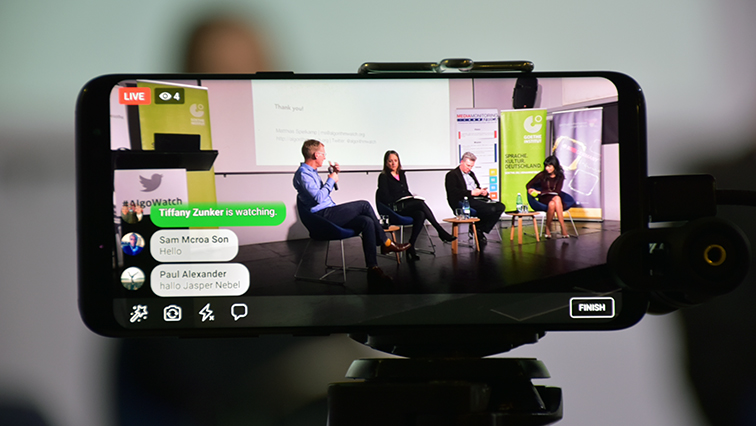If you use a device to connect to the digital world, algorithms affect you. When you log onto a social media platform, call an Uber or Google a burning question, lines of code run in the background to decide what content and option is best tailored to you.
Matthias Spielkamp, founder and Executive Director of AlgorithmWatch explains that algorithms can have an impact on your credit rating or even medical diagnosis.
“Computers can now suggest all kinds of medical treatments. They even tell your bank whether or not you should be given a loan. These decisions are based on troves of data that are analysed by algorithmic systems and we think that it is very important that we, as a society, ask for accountability and scrutinise these systems to find out whether they actually work in a way that we appreciate and not in a way that we don’t.”
Algorithms are widely used throughout all areas of information technology and daily life.
Simply put, an algorithm is a set of guidelines or sequences that describe how to perform a task. As technology advances, so does the automation of these sequences.
Algorithms affect us more as processes in our lives become automated.
Algorithms are even used for high-risk decisions on whether a criminal should be released from prison or not.
How can we empower consumers to discern mis- or disinformation? @Billbobbird from @mediamattersza: “We have to break those echo chambers and part of that is making readers aware of the algorithms that helping create these echo chambers.”#Algowatch @goethejoburg @GermanyInAfrica
— Tiffany Jackson-Zunk (@TiffTweetz) July 31, 2018
Spielkamp explains that we need to look at these computerised decisions very closely and that transparency is key in the companies which employ these systems.
“Algorithms can get it wrong very often – at the same, we are not against using these systems because human-based decisions are erroneous many times as well. What we are saying is that don’t demonise these technologies, we are about developing these technologies in a way that we as a society have a say in it.”
The Dangers of Fake News
With information readily available at our fingertips, the world has clearly changed. In the past, we would get our news from a reliable source which we would have had to seek out by buying the morning paper, tuning into the radio or watching the evening bulletin.
Now, it is a struggle to source credible and reliable information in a never-ending stream of information from various platforms.
Our electoral code says nothing about digital media – @Billbobbird warns the audience that SA isn’t ready for the fake news onslaught that might happen during #Elections2019 #AlgoWatch
— Siyabonga Africa (@siyafrica) July 31, 2018
William Bird, director of Media Monitoring Africa, explains that the spreading of misinformation actually undermines our basic democratic rights.
“If you think back to a different time, it’s as dangerous as spreading a rumour that black people are inhuman – it’s that same kind of thing. There’s no logic to it. It’s driven by some other kind of agenda and the moment you allow that idea to fester and dominate people start to believe it.”
“For example, if our government says that this is the unemployment rate – and then someone goes around and spreads a rumour and says something completely different – and the one is accurate and the other one is completely deliberately misinforming you, as a normal citizen you don’t know which one to believe. So instead of being informed and being able to engage, you can’t participate as an informed citizen. The more you undermine that, the more you undermine all basic democratic rights.”
Spielkamp says that fake news affects all us due to the way that information is disseminated by the various platforms.
“More and more platforms play a big role as intermediaries. For example, YouTube, Facebook or Twitter, curate news. That means the platforms select and aggregate news and present them in a specific way that is personalised to each and every user and this can be manipulative.”
“I’m not saying that for example, Facebook is trying to manipulate the sentiment in South Africa or the public discourse. I’m saying that it can happen because mistakes are made – or even from some bad modeling that is employed. If we have a situation like here where there is a lot of polarisation in the population and we have the run-up to the elections next year – we should worry about this and we should ask for more accountability and explanation of these systems.”
Bird emphasises that South Africans need to become more aware and think before they share misinformation. He says that there a couple of interlinking challenges facing the country at the moment.
“The one is that our journalism is in crisis financially. There’s a crisis around trust and credibility and then there is a dire need for digital and media literacy. We are working around each of those areas and specifically encouraging people to think before they share and to give them the skills to be able to spot dodgy news.”
@Billbobbird: Bots are getting more sophisticated every week. Detecting them is becoming more and more difficult. Attacking the media fundamentally undermines democracy. #AlgoWatch
— Esme Arendse (@EsmeArendse) July 31, 2018
Spielkamp says that the public should be aware due to more of these systems determining and having power over parts of our lives.
“I’m not arguing that they really determine our lives, that would go way too far as we are still the masters of our destiny, but, slowly but surely the usage of these systems increases. There are more and more algorithms watching us – and we need to watch these algorithms closely ourselves.






